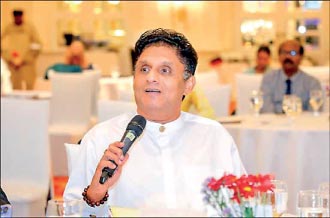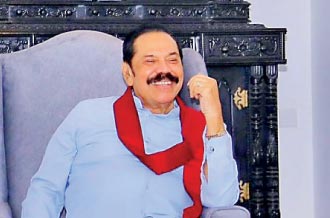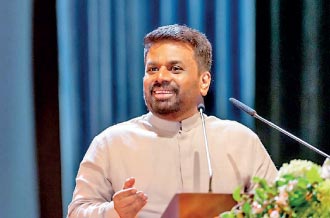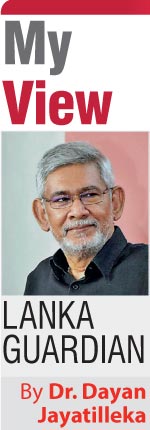Tuesday Feb 17, 2026
Tuesday Feb 17, 2026
Thursday, 13 February 2025 03:45 - - {{hitsCtrl.values.hits}}

Needs to clarify SJB’s identity, policy platform

Mahinda’s exceptionality

Independence or In Dependence?
 The 77th Independence Day saw Sri Lanka more ‘in dependence’ than independent. Tamil Nadu fishermen invade our territorial waters, disobey our Navy, and when they sustain injuries while grappling with the legitimate navy in waters where they are acting as pirates, our closest friend India summons our diplomats and issues a stern admonition though we are defending our own waters from predators who deprive our citizens of nutrition, and our fishermen, especially in the North, of their catch and potential earnings. If the Tamil Nadu fishermen find their waters running out of fish, why don’t they sail up the ample coasts of India or venture further into the ocean named after their country instead of poaching in our waters?
The 77th Independence Day saw Sri Lanka more ‘in dependence’ than independent. Tamil Nadu fishermen invade our territorial waters, disobey our Navy, and when they sustain injuries while grappling with the legitimate navy in waters where they are acting as pirates, our closest friend India summons our diplomats and issues a stern admonition though we are defending our own waters from predators who deprive our citizens of nutrition, and our fishermen, especially in the North, of their catch and potential earnings. If the Tamil Nadu fishermen find their waters running out of fish, why don’t they sail up the ample coasts of India or venture further into the ocean named after their country instead of poaching in our waters?
On his visit to Delhi, the first state visit by him, President Anura Dissanayake failed to secure a written agreement from India to prevent these incursions, the most pressing issue in our bilateral relationship.
Having wagged a finger at the Sri Lankan diplomats in a matter where the fault is not with Sri Lanka but with the Indian side (it’s their fishermen), we have not seen a news item which says that India hauled in US diplomats and remonstrated with them about Indian citizens –including women--who are illegal immigrants to the USA but not a gang of robbers, being repatriated to India in US military aircraft, handcuffed and their legs shackled. (https://au.yahoo.com/news/treated-criminals-shackling-indians-aboard-144230777.html)
However friendly and helpful India has been, is, and may continue to be towards Sri Lanka, Modi’s India will always place Tamil Nadu with its 80 million people, even if some strata are manifestly in the wrong, over the interests of Sri Lanka. This is only natural. What is unnatural is that AKD and the NPP are oblivious to this reality.
AKD is beckoning the same India which is upbraiding our diplomats while permitting Tamil Nadu fishermen to ravage our natural resources, to have a much larger footprint in the North and East than it has ever had-- more oil tanks than any previous Sri Lankan leader has permitted and with an oil refinery thrown in, plus the prospect of energy ‘connectivity’ i.e., India’s energy domination and Sri Lanka’s energy dependence.
What if the fisheries issue or any other issue with Tamil Nadu escalates to a point that Tamil Nadu public opinion – say in an election year—demands measures against Sri Lanka? Who is to say that Sri Lankan biometric information, energy dependence or many of the other levers that the AKD administration is placing in the hands of India, will not be used against us?
As we turn 77, at the deep south of this small island there’s also the enhanced Chinese footprint that AKD has sought or assented to in Hambantota. What is to say that the irrational Trump administration which has China in its sights will not perceive Hambantota --and Sri Lanka-- in an adversarial light? AKD is painting a target on our back.
Instead of balancing between India and China by operating in the space in-between, Anura is giving both powers geostrategic and geoeconomic space in and on this small island, enhancing our vulnerability.
Debt dependency
The tightest grip of dependence during this 77th year of independence is that of foreign indebtedness/repayment. Sri Lanka has one of the world’s highest ratios of debt repayment to revenue. An outflow of 1.3 billion US dollars on importing cars as the NPP Government is doing, is an unconscionable exacerbation.
Why didn’t AKD leverage the fact that his is a left-oriented party with a massive parliamentary mandate for a revision of Ranil’s approach on the debt issue, rally a national and international counter-coalition in support and solidarity, and push for a less onerous debt repayment agreement? Why not try one’s best? Why not try at all? Why merely sign on the dotted line on an ‘agreement on principle’ arrived at by Ranil Wickremesinghe which AKD and the NPP had strenuously condemned?
AKD’s behaviour on the debt issue is strikingly similar to that of Prime Minister Ranil Wickremesinghe’s in 2001, when he ‘solved’ the main threat to the country at that time, that of secessionist war waged by the terrorist Tigers, by swiftly signing a lopsided Ceasefire Agreement of abject appeasement with Prabhakaran. AKD has done exactly the same thing with the private bondholders, local and foreign. He has lined the pockets of hyper-rich local and foreign private bondholders while doubling the withholding tax on fixed deposits in Sri Lankan banks, thus halving the income of retirees who subsist on the interest on their life-savings.
AKD and the NPP administration have given every intention of resorting to foreign borrowings, but shouldn’t a thick demarcation should be drawn between bilateral and multilateral foreign borrowing on the one hand, and private foreign borrowings on the other? Any administration trying to extricate the country from debt dependence should consider recourse to the private money markets – as distinct from states and multilateral institutions--as a redline which should not be crossed, and introduce legislation to that effect. Anura and the NPP aren’t that sort of administration.
Guilty Six
The AKD-NPP administration has surpassed every previous administration in heightening the country’s dependence in both basic domains: geostrategic and economic. Six persons are primarily responsible for all these negatives and everything that will befall this country as a consequence:
 Anura Dissanayake who is hypocritically doing the exact opposite of what he obtained a mandate for. Elected as an alternative to Ranil Wickremesinghe’s policies, he has committed to, is continuing, completing and extending the policy agenda of his neoliberal predecessor which he condemned and which the people voted against.
Anura Dissanayake who is hypocritically doing the exact opposite of what he obtained a mandate for. Elected as an alternative to Ranil Wickremesinghe’s policies, he has committed to, is continuing, completing and extending the policy agenda of his neoliberal predecessor which he condemned and which the people voted against.
 Ranil Wickremesinghe who ran a suicide-truck candidacy and ensured AKD’s victory.
Ranil Wickremesinghe who ran a suicide-truck candidacy and ensured AKD’s victory.
 Sajith Premadasa who dumped his Nov 2019 discourse and style which brought him a 42% vote (AKD obtained only 42% when winning); abandoned his father’s proven, path-breaking paradigm, preferring instead a neoliberal economic policy troika and Blueprint infinitely inferior to President Premadasa’s model. This rendered Sajith’s candidacy and party vulnerable to Anura’s anti-establishment/anti-austerity candidacy and Ranil’s ‘wrecking ball’ candidacy.
Sajith Premadasa who dumped his Nov 2019 discourse and style which brought him a 42% vote (AKD obtained only 42% when winning); abandoned his father’s proven, path-breaking paradigm, preferring instead a neoliberal economic policy troika and Blueprint infinitely inferior to President Premadasa’s model. This rendered Sajith’s candidacy and party vulnerable to Anura’s anti-establishment/anti-austerity candidacy and Ranil’s ‘wrecking ball’ candidacy.
 Harsha de Silva-Eran Wickremaratne-Kabir Hashim who opposed and delayed Sajith’s imminent acceptance of the Prime Ministership in April 2022 thereby enabling Ranil to clinch it, and tirelessly announced that the SJB approved of Ranil’s economic strategy, doctrine and direction-- which post-Aragalaya anti-incumbency voters rejected. Wittingly or not, they were Ranil’s Fifth Column in the SJB.
Harsha de Silva-Eran Wickremaratne-Kabir Hashim who opposed and delayed Sajith’s imminent acceptance of the Prime Ministership in April 2022 thereby enabling Ranil to clinch it, and tirelessly announced that the SJB approved of Ranil’s economic strategy, doctrine and direction-- which post-Aragalaya anti-incumbency voters rejected. Wittingly or not, they were Ranil’s Fifth Column in the SJB.
SJB’s foundational flaw
A Government or incumbent losing an election is commonplace and the causes are transparent. By contrast, when there is a massive swing against a government and the main Opposition party is not the main beneficiary, but actually shrinks in its vote share and seats relative to the previous election as the SJB has done, while another much smaller Opposition party catapults to the top, the problem is profoundly structural.
Sajith Premadasa scored 42% against the powerfully ascendent Gotabaya Rajapaksa in November 2019. He dropped to 32% against the unelected Ranil Wickremesinghe and his defective SLPP defectors in 2025. The SJB had 50+ seats at its first outing in August 2020. It dropped to 40 at its second outing in 2025.
Something is chronically wrong with the SJB, but it is no opaque, complex mystery because its parent party went the same route: the UNP under Ranil Wickremesinghe declined from the island’s largest single political party to Ground Zero.
Though the SJB broke away organisationally from the UNP, it’s policy and ideological continuity with the parent party has resulted in a continuity of electoral trend and outcome. The SJB is on the same path of structural shrinkage as the parent UNP. Insofar as the SJB carries the same ideological and political ‘genes’ as the UNP, it is ‘genetically’ predisposed, even foredoomed, to defeat.
SJB spokespersons assert that they broke away from the UNP, not because of substantive i.e., doctrinal-programmatic-ideological or policy differences but due to:
 Absence of inner-party democracy.
Absence of inner-party democracy.
 Ranil’s inadequate personal appeal at presidential elections.
Ranil’s inadequate personal appeal at presidential elections.
Such superficiality contrasts sharply with SWRD Bandaranaike’s stance and discourse when he and DA Rajapaksa crossed the floor of the House, quitting DS Senanayake’s UNP. Godfrey Gunatilleke served with DS at the time, and his autobiography records the substantive rupture:
‘…His [SWRD Bandaranaike’s] resignation had revealed that his support in parliament was as yet marginal…The main theme of Bandaranaike’s speech was that there were fundamental differences of policy between him and the Prime Minister…Bandaranaike stated he could not accept the continuation of the pre-independence colonial policy regime. He did not see any prospect of the present government promoting the radical changes that were needed to improve the well-being of the common man…While Senanayake was content with changes taking place ‘hemin, hemin’ slowly, slowly, within a capitalist democracy, Bandaranaike was calling for radical structural reforms within “a people’s democracy” ...’ (Gunatilleke, Chaos & Pattern, Vol II, Ch: 30, pp. 46-49).
Thus, it is no surprise that SWRD Bandaranaike, starting with “marginal” parliamentary support in 1951, won the 1956 election following the 1953 Hartal, outflanking the Marxist Left which led the latter. The ‘Middle Path’ centre-left he founded, ruled the country as SLFP or SLPP in 1956-1959, 1960-1964, 1970-1977 and most strikingly, 1994-2024.
20 years later came R. Premadasa’s Third Way. He rolled-out a new, progressive, even radical policy perspective –flagging ‘socialism’--in a speech at the Rotary Club Colombo West on April 4th 1973 when he was leading the Puravesi Peramuna (Citizens’ Front) while polemicizing with UNP leader and ex-PM Dudley Senanayake. In 1988 Premadasa dropped the UNP’s colour green and ran for president against Madam Bandaranaike on a neo-Rooseveltian platform, his manifesto ‘A New Vision, A New Deal’. In 1991, as President and SAARC Chairperson he got his April 1973 Rotary Club speech republished in the Daily News which first ran it in 1973, thereby underscoring continuity of his distinctive ideology and ideas.
A policy dissident even while PM, Premadasa as candidate of an utterly unpopular UNP regime, pivoted away from it, beating formidable Opposition leader Sirimavo Bandaranaike in the presidential election of 1988 in the face of obstructionist JVP carnage. He snatched victory from the jaws of defeat. Sajith did the opposite, snatching defeat from victory in 2024, though Premadasa 1988 should have been the obvious prototype for his only son.
Never at any time from the inception of the SJB (2020) to date (2025) has Sajith Premadasa made any declaration and the SJB adopted any document explicitly laying out the substantive policy differences with Ranil Wickremesinghe and his UNP. That’s why the SJB which started with 50 seats in Parliament in 2020, could backslide towards Ranil Wickremesinghe’s post-Aragalaya stabilisation/austerity program, instead of firewalling itself from the unmandated incumbent. The SJB was screeching “Bankrupt!...Blueprint!” when it should have been chanting “Elections!” every waking minute to remind itself of its topmost priority. Easily outflanked by the JVP-NPP, it not merely lost, but fared worse at both Presidential and parliamentary elections 2024 than Sajith did in 2019 and the SJB in 2020.
The UNP’s decline, currently replicated by the SJB which has begun the same downswing, originated with the Premadasa assassination and the abandonment by his successors of his vote-winning ‘growth-with-equity’ policy paradigm, caused by and coinciding with the re-induction of the anti-Premadasa breakaway DUNF which had sought to impeach him. The reunified UNP returned to the pre-Premadasa position, profile and policies. Since 1994, neither it nor its subsequent (2020) spinoff the SJB were ever elected to lead the country again.
Before Ranil, no UNP leader, all of whom (DB Wijetunga apart) were elected to the country’s leadership, aligned his party with an international ideological bloc and handed the education of party members to foreigners/foreign organisations. After Ranil hooked-up the UNP with the International Democratic Union (IDU), the global cartel of the neoliberal Right/Centre-Right/Conservatives, UNP (today’s SJB) members were indoctrinated from 1997 in the rightwing ideology of the International Republican Institute (IRI).
Sajith’s SJB continued the practice— though, paradoxically, it never had a single seminar on President Premadasa even in 2024, his birth centenary year which was also election year.
Imthiaz Bakeer Markar and Pradip Jayewardene excepted, SJBers are ignorant about the UNP’s 1977 and 1988-’89 comebacks. Neither the 1977 ‘grand slam’ nor the 1988 miraculous turnaround bore the stamp of BR Shenoy-Esmond Wickremesinghe economics (1966) or prefigured neoliberal Ranilnomics (2001-2024).
Sajith failed to base and build his new party on the impregnable foundation of Ranasinghe Premadasa’s paradigm, thereby abandoning his heritage and comparative advantage. Mangala Samaraweera-ism was ideologically more influential in the SJB than Premadasa-ism. Instead of returning to the social strategy and successful policies of the Premadasa period as start-line, Sajith’s SJB sought to capture Ranil’s UNP space, be a replacement/substitute, not an alternative.
The SJB is unable to conceptualise, strategise, and remains ad-hoc in approach because it does not know why it exists and should exist independently, what its unique identity, guiding ideas and ideology are, what it stands for, and where it stands in the national spectrum.
Mahinda The Exception
If, even out of deference to the young Marx who wrote his doctoral thesis on two Ancient Greek philosophers, the JVP-NPP leaders had a fleeting acquaintance with Greek philosophy, they’d know of Aristotle’s insistence that what is equal should be treated equally, what is unequal should be treated unequally. Endorsing Aristotle, the great American democrat Thomas Jefferson warned that nothing is more unequal than the equal treatment of the unequal.
From the perspective of ‘long history’ Mahinda Rajapaksa cannot be equated with any Sri Lankan leader or politician alive today. He falls into the category of ‘The Exception’ (Soren Kierkegaard, Carl Schmitt) because his historical role and contribution have been singular. He ended a war that four previous Presidents couldn’t, winning it decisively, restoring peace and the island’s territorial unity after thirty years.
The late Meghnad Desai, Professor Emeritus at the LSE, renowned expert on Karl Marx’s economics and member of the UK House of Lords, likened Mahinda Rajapaksa to Abraham Lincoln in his piece on ‘Unity in Diversity: Sri Lanka @62’:
“Was Abraham Lincoln a war criminal?...By some device or other, Rajapaksa, whom many underestimated, took the decision that he would end the war regardless of the loss of life involved. The carnage was incredible but, in the end, Prabhakaran was defeated and killed. The LTTE’s gamble had failed.
It may sound callous to say this, but Rajapaksa would be regarded as the savior of his nation. Modern nations, especially post-colonial ones, value the integrity of their territory and do not entertain violent sub-nationalisms…”
(www.khaleejtimes.com/DisplayArticle08.asp?xfile=data/opinion/2010/February/opinion_February21.xml§ion=opinion)
AKD ridiculing Mahinda in Jaffna about his expansive and expensive official accommodation while not saying a word in passing against Prabhakaran, leaves a negative impression of preferential pandering. MR is a father figure to most, and not just any father figure-- he is a Re-Founding Father. Nudging 80, he is in fluctuating health. If he dies (of natural causes) on AKD’s watch, a tsunami of national sympathy bearing the anguish of loss and angry memories of Anura’s crass, insolent harassment will slam into the JVP-NPP establishment.